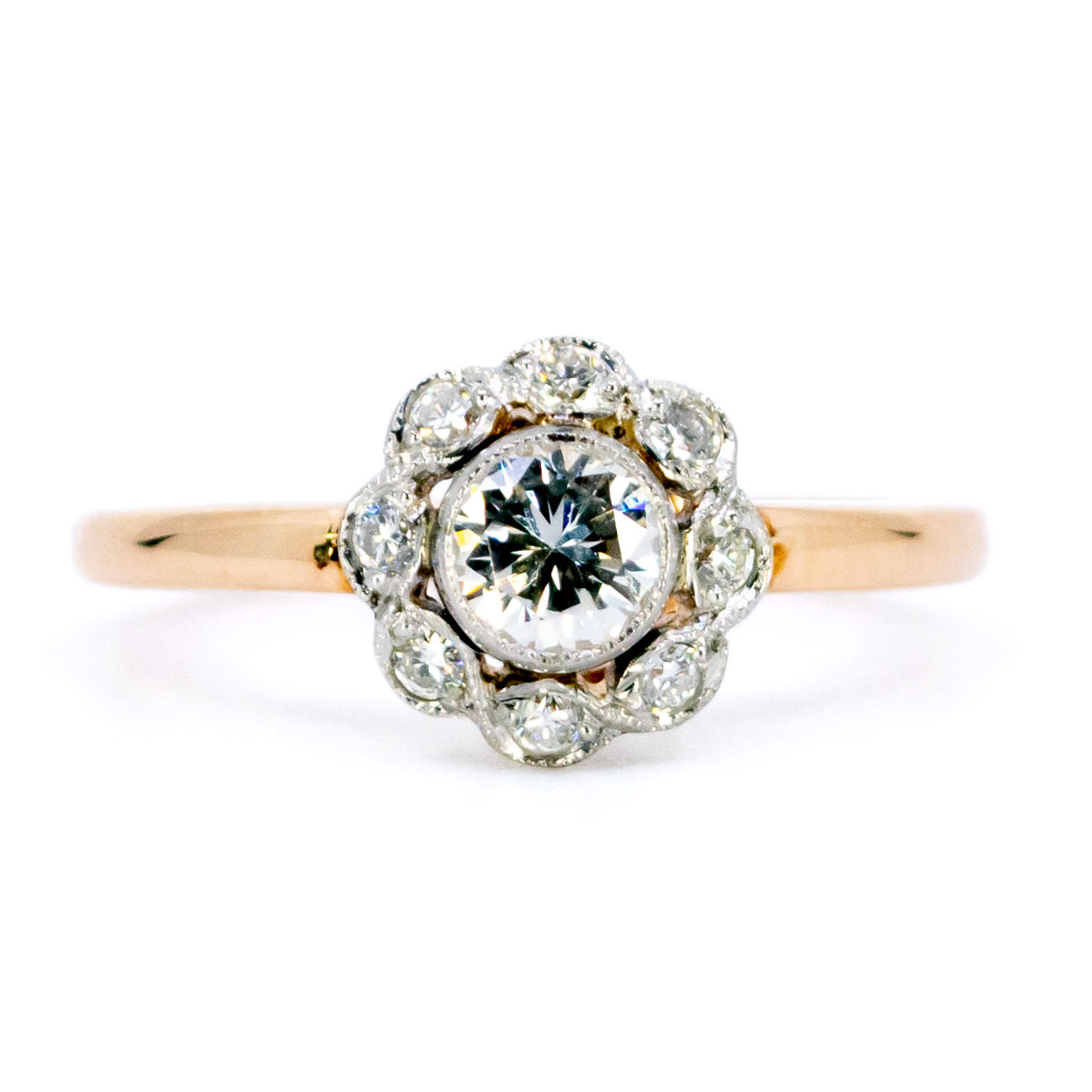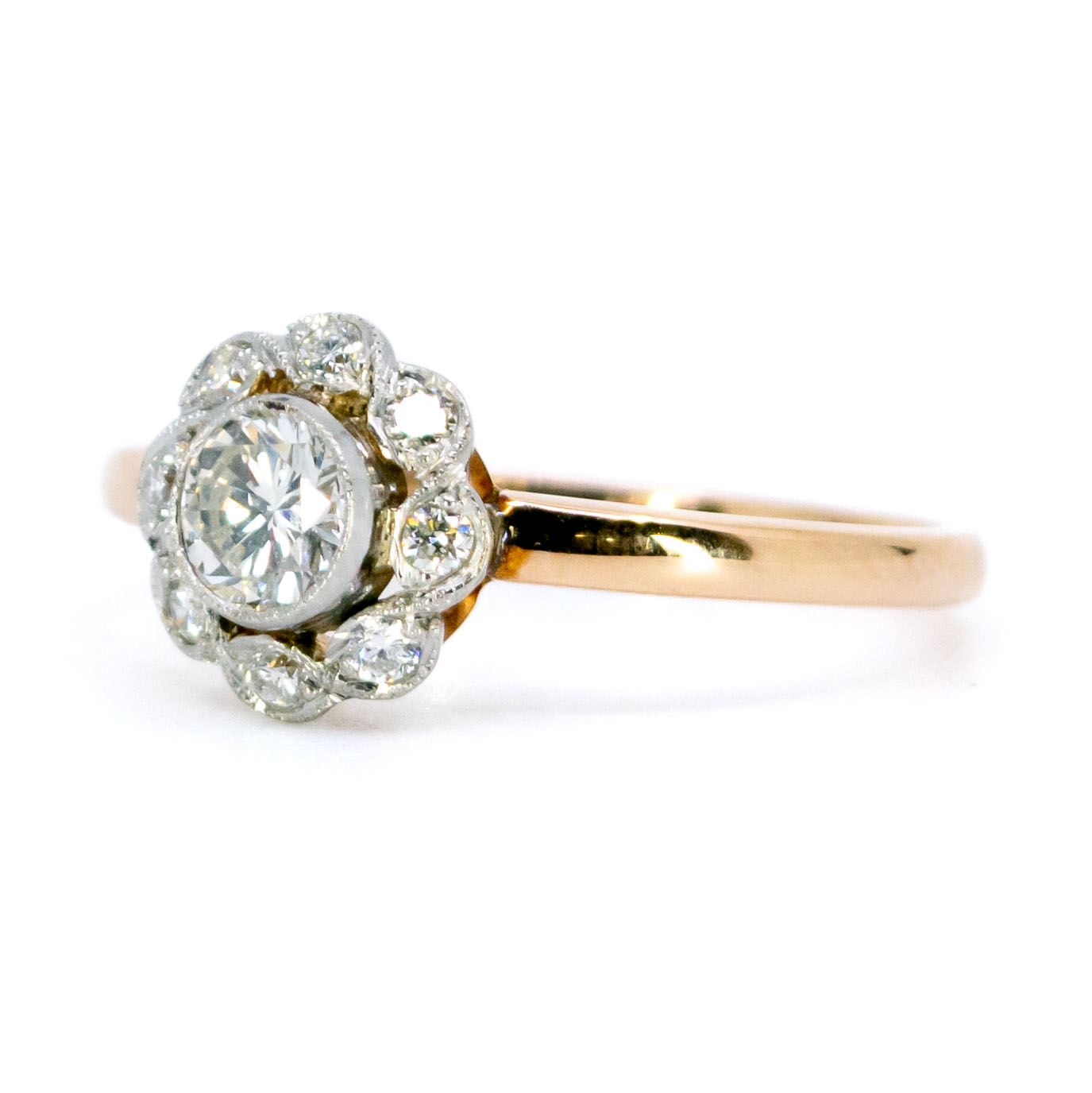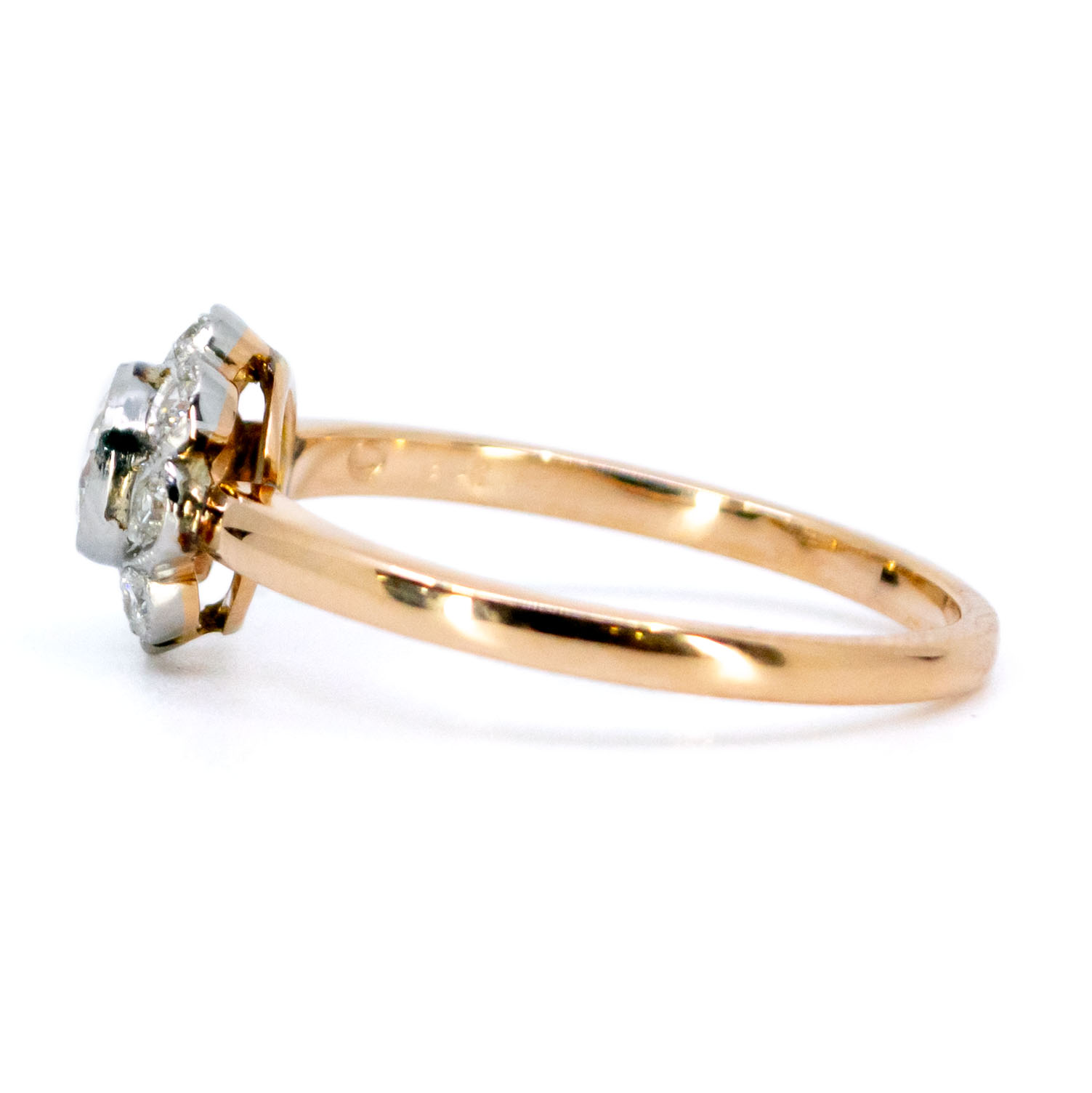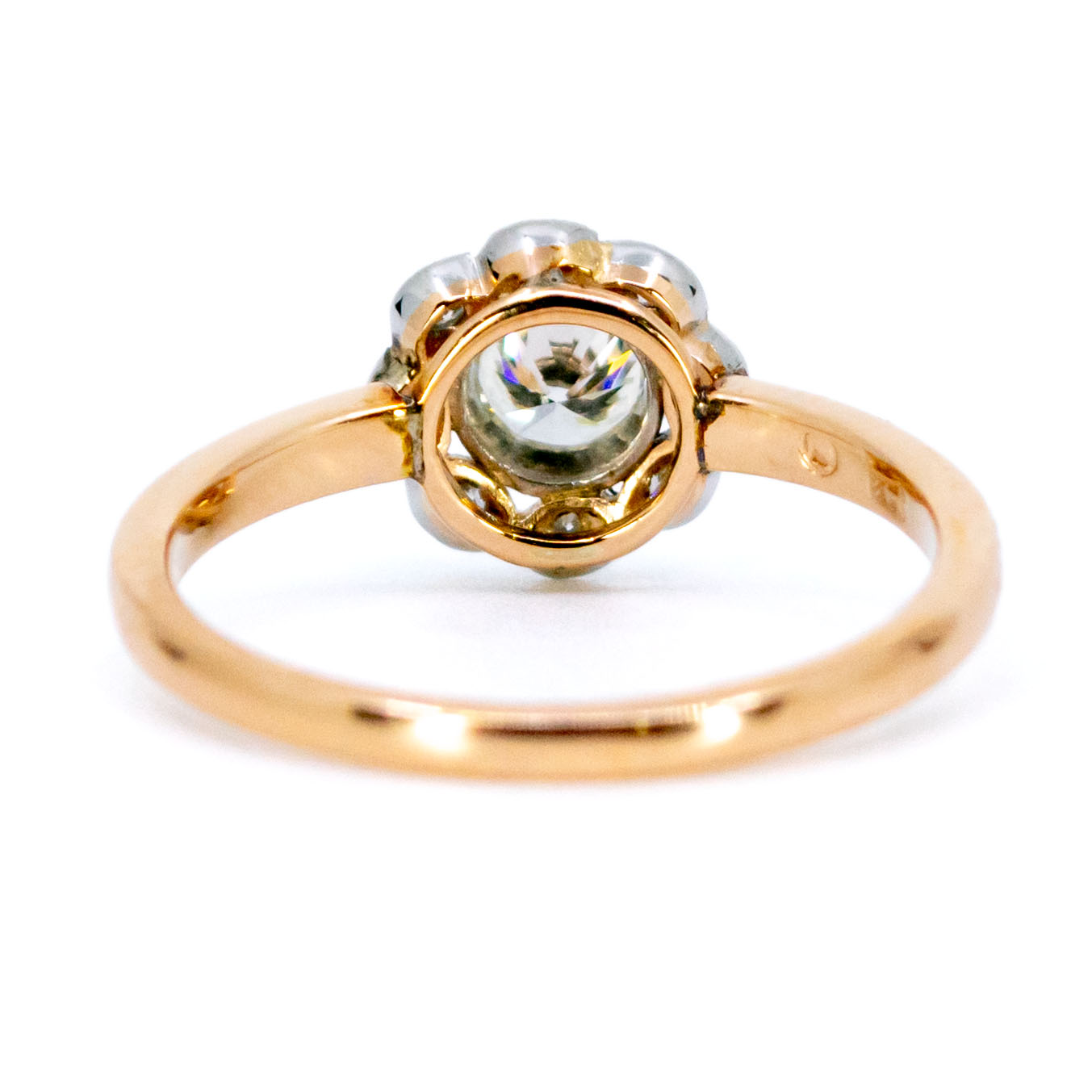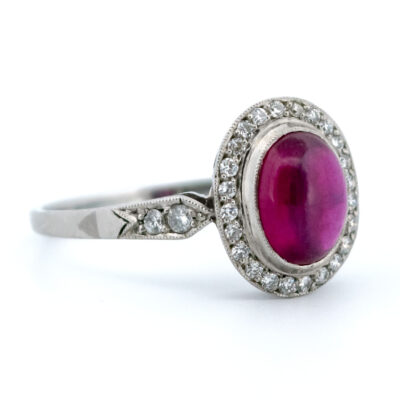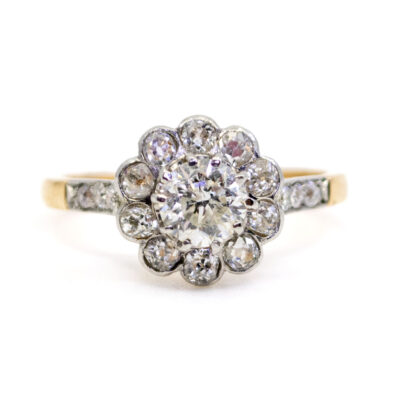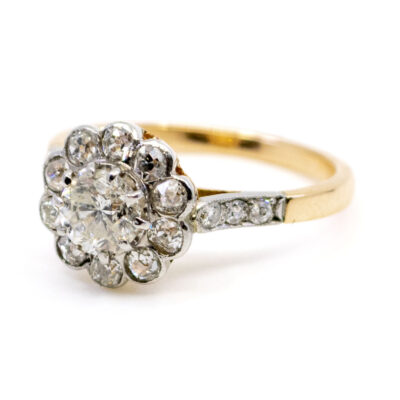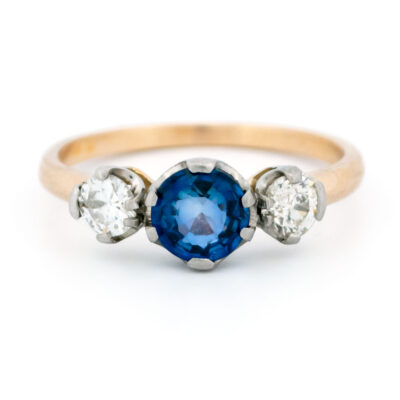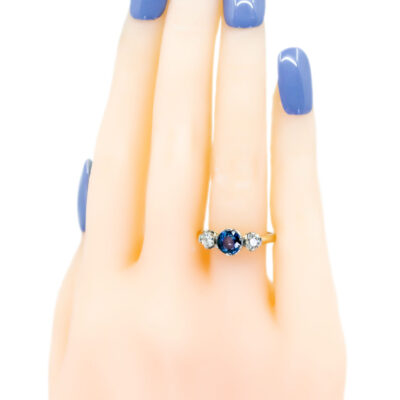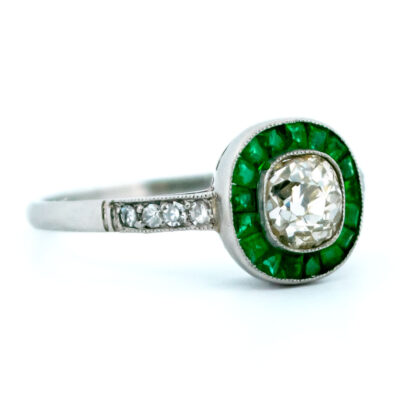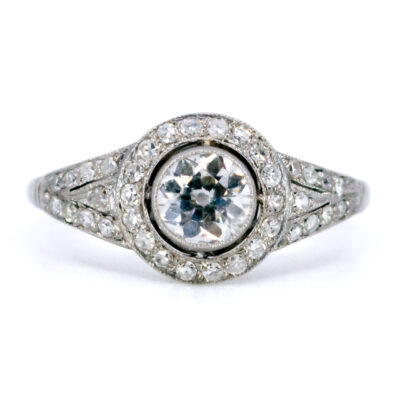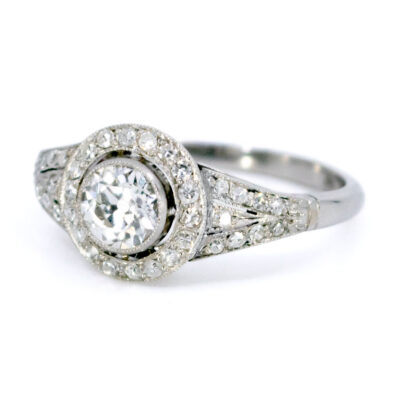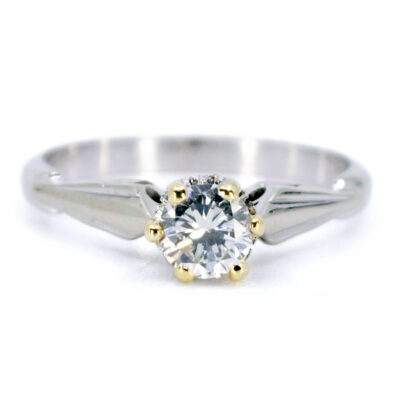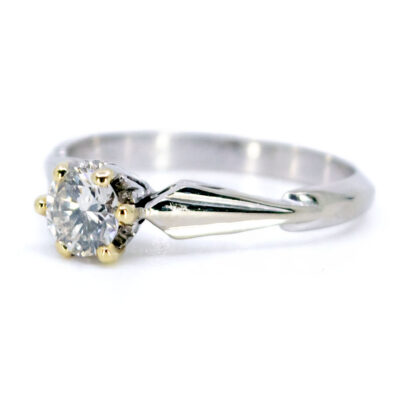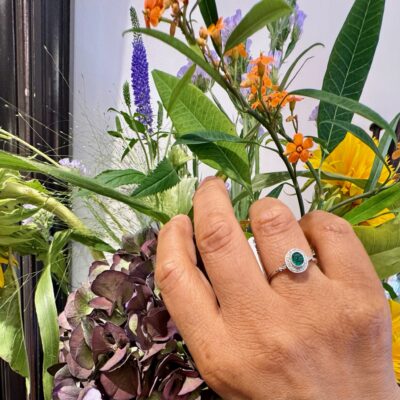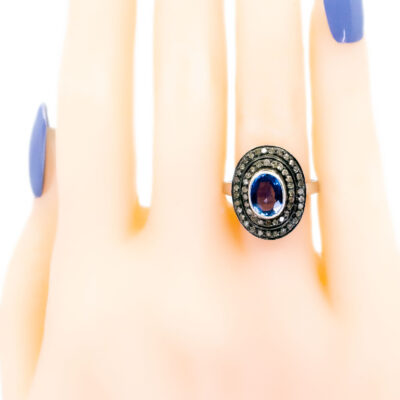This lovely 18k and platinum ring features a round Brilliant Cut Diamond weighing approximately 0.35ct with an H VS1 grade, surrounded by a halo of Brilliant Cut Diamonds weighing approximately 0.15ct. The halo design and Victorian style add a charming vintage touch to this piece.
Videos
Details: ±0.35ct (H VS1) Brilliant-cut diamond, ±0.15ct Brilliant-cut diamonds, 14k, Platinum Ring.
Design Era: Binenbaum Vintage Revivals.
Size: 17.12 NL / 53.8 FR / 6¾ US / N UK, sizeable (Within reason. Contact seller for information).
Dimensions: H 0.4 x L 0.9 x W 0.9 cm.
Weight in grams: 3.5.
Condition: Very good condition – slightly used with small signs of wear.
Shipping and Pickup: This charming piece ships from our store located in the center of Amsterdam, The Netherlands. We offer both registered shipping and local pickup at our store. In the case of local pickup, any applicable shipping costs will be refunded.
About Us: Add some sparkle to your style with Binenbaum.com. We offer a stunning selection of antique and vintage jewelry that you won’t find anywhere else. From timeless rings and dazzling necklaces to unique brooches, we have something for every taste and occasion. Visit our website today and treat yourself to a piece of history.
| Design Era | |
|---|---|
| Design & Historical Context | At Binenbaum, our 40-year legacy, dating back to the early '80s, is more than just selling jewelry; it's about crafting timeless pieces that blend history with modern quality. Introducing our latest creation: Binenbaum Vintage Revivals. This unique collection draws inspiration from historic eras like Art Deco and Victorian to create contemporary designs that resonate with timeless elegance. But what truly sets Binenbaum Vintage Revivals apart is our commitment to sustainable luxury. We don't just mimic vintage styles; we revitalize and repurpose antique jewelry, ensuring each piece is both enduring and exquisite. In doing so, we infuse our personal touch into every creation, making each item a tribute to the rich history of jewelry and a story yet to be told. |
| Key Materials | |
| Materials & Craftsmanship | Brilliant-cut diamond: The Pinnacle of Sparkle and Brilliance The brilliant-cut diamond is the most popular and widely recognized diamond cut in the world, renowned for its exceptional sparkle and fire. This cut, perfected over centuries, is designed to maximize the reflection of light, creating the dazzling brilliance that has made it the standard for diamonds in modern jewelry. The brilliant cut features 58 facets—33 on the crown and 25 on the pavilion—carefully arranged to capture and reflect light from every angle. The precision of these facets ensures that light entering the diamond is reflected internally and dispersed into a stunning array of colors, giving the stone its characteristic brilliance. Historically, the brilliant cut evolved from earlier cuts like the Old European and rose cuts, with advancements in diamond cutting technology and understanding of light reflection. This modern cut became widely adopted in the early 20th century and quickly became the preferred choice for engagement rings and other fine jewelry, due to its unmatched sparkle. In modern jewelry, brilliant-cut diamonds are prized for their versatility and unmatched brilliance. They are the go-to choice for engagement rings, earrings, pendants, and virtually any jewelry piece where a classic, sparkling diamond is desired. The round shape and symmetrical design make the brilliant cut ideal for showcasing the inherent beauty of the diamond, regardless of its size. A brilliant-cut diamond is more than just a gemstone; it is a symbol of timeless beauty and perfection. Its unparalleled sparkle and universal appeal make it the quintessential choice for jewelry that celebrates life's most precious moments. Brilliant-cut diamond: The Pinnacle of Sparkle and Brilliance The brilliant-cut diamond is the most popular and widely recognized diamond cut in the world, renowned for its exceptional sparkle and fire. This cut, perfected over centuries, is designed to maximize the reflection of light, creating the dazzling brilliance that has made it the standard for diamonds in modern jewelry. The brilliant cut features 58 facets—33 on the crown and 25 on the pavilion—carefully arranged to capture and reflect light from every angle. The precision of these facets ensures that light entering the diamond is reflected internally and dispersed into a stunning array of colors, giving the stone its characteristic brilliance. Historically, the brilliant cut evolved from earlier cuts like the Old European and rose cuts, with advancements in diamond cutting technology and understanding of light reflection. This modern cut became widely adopted in the early 20th century and quickly became the preferred choice for engagement rings and other fine jewelry, due to its unmatched sparkle. In modern jewelry, brilliant-cut diamonds are prized for their versatility and unmatched brilliance. They are the go-to choice for engagement rings, earrings, pendants, and virtually any jewelry piece where a classic, sparkling diamond is desired. The round shape and symmetrical design make the brilliant cut ideal for showcasing the inherent beauty of the diamond, regardless of its size. A brilliant-cut diamond is more than just a gemstone; it is a symbol of timeless beauty and perfection. Its unparalleled sparkle and universal appeal make it the quintessential choice for jewelry that celebrates life's most precious moments. 14k: The Durable Choice for Everyday Elegance 14k gold is a popular and practical choice in fine jewelry, known for its durability, affordability, and beautiful color. The 14k signifies that the gold is composed of 58.3% pure gold and 41.7% alloyed metals, such as copper, silver, nickel, or zinc. This combination results in a strong and resilient material that can withstand the rigors of daily wear, making it an ideal option for those seeking both beauty and durability. Historically, gold has always been a symbol of wealth and luxury, and 14k gold strikes a perfect balance between the rich appearance of gold and the strength needed for everyday use. Because of its lower gold content compared to 18k or 24k gold, 14k gold is more affordable, making it a popular choice for a wide range of jewelry pieces. In modern jewelry, 14k gold is appreciated for its versatility and variety. It is available in several colors, each achieved by mixing gold with different metals: Yellow Gold: A classic and timeless choice, 14k yellow gold has a warm, golden hue that complements most skin tones and is well-suited for both modern and traditional designs. White Gold: Created by alloying gold with white metals like nickel or palladium, 14k white gold has a sleek, silver-like appearance. It is often rhodium-plated for added shine and is a popular choice for engagement rings and other contemporary jewelry. Rose Gold: Achieved by mixing gold with copper, 14k rose gold has a soft, pinkish hue that has gained popularity for its romantic and vintage appeal. It is a favorite for those seeking a unique and stylish alternative to traditional gold colors. 14k gold is commonly used in a wide array of jewelry, including rings, necklaces, bracelets, earrings, and watches. Its durability makes it especially suitable for pieces that are worn daily, such as wedding bands and engagement rings, where the balance between strength and beauty is crucial. 14k gold is more than just a practical choice; it is a symbol of enduring style and everyday luxury. Its ability to retain the look of gold while offering greater resistance to scratches and dents makes 14k gold a versatile and timeless option for any jewelry collection. Whether in a simple band or an elaborate design, 14k gold offers a perfect blend of elegance and durability that can be enjoyed for years to come. Platinum: The Metal of Endurance and Prestige Platinum, a rare and precious metal, is renowned for its exceptional strength, purity, and enduring beauty. With its naturally white luster and remarkable resistance to tarnish and corrosion, platinum has become synonymous with luxury and durability in the world of fine jewelry. Historically, platinum has been valued for its rarity and unique properties. Ancient Egyptians and Pre-Columbian civilizations used platinum in their ceremonial jewelry, though its full potential wasn’t realized until the 18th century. By the 20th century, platinum became the metal of choice for royalty and high society, particularly in engagement rings and fine jewelry, due to its ability to securely hold precious gemstones. In modern jewelry, platinum is highly prized for its hypoallergenic properties and its ability to withstand daily wear without losing its brilliance. Its density and weight give it a luxurious feel, while its purity—often 95% pure—makes it an ideal setting for diamonds and other gemstones. Platinum's naturally white sheen enhances the sparkle of gems, and its durability ensures that jewelry pieces crafted in platinum can be passed down through generations. Platinum is more than just a metal; it is a symbol of strength, rarity, and timeless elegance. Its unmatched durability and sophisticated appearance make it the ultimate choice for those seeking jewelry that lasts a lifetime while maintaining its prestige and beauty. |
| Size | |
| Dimensions | H 0.4 x L 0.9 x W 0.9 cm |
| Gender | |
| Weight (in grams) | 3.5 |
| Condition | Very good condition – slightly used with small signs of wear |
By following these tips, you can enjoy your precious jewelry for many years to come.
Related Products
-
Diamond Ruby Platinum Halo Ring 5150-4718
€ 2.995,00 VAT incl. (where applicable) -
Diamond 14k Platinum Cluster Ring 10314-4983
€ 4.895,00 VAT incl. (where applicable) -
Diamond Sapphire 14k Platinum Trilogy Ring 14408-5114
€ 3.295,00 VAT incl. (where applicable) -
Emerald Diamond Platinum Halo Ring 13211-5050
€ 3.895,00 VAT incl. (where applicable) -
Diamond Platinum Halo Ring 12837-5048
€ 4.895,00 VAT incl. (where applicable) -
Diamond Platinum 18k Solitaire Ring 7438-0749
€ 2.295,00 VAT incl. (where applicable) -
Emerald Diamond Platinum Halo Ring 7518-4916
€ 2.695,00 VAT incl. (where applicable) -
Sapphire Diamond 14k Halo Ring 13705-8209
€ 1.995,00 VAT incl. (where applicable)
- Home
- Collection
- Fine Jewelry
- Silver Jewelry
- Silverware
- Boxes
- Candlesticks
- Salt and pepper shakers
- Miniatures
- Salt cellars
- Spoon Set
- Condiments
- Frames
- Napkin Ring
- Spoon
- Oddities
- Cups
- Vases
- Cutlery
- Serving Spoon And Cake Server
- Candlesticks
- Baskets
- Hanukkiah
- Spice Tower
- Yad
- Tea Set
- Sugar Castor
- Napkin Rings
- Wine Bottle Coaster
- Wine Stopper
- Tea Pot
- Jugs
- Rattles
- Hip Flask
- Miscellaneous
- Rings 💍
- About
- Contact
- No products in the cart.
